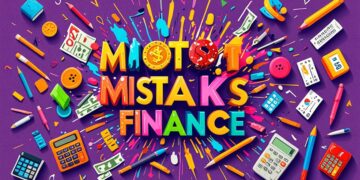Main Mistakes When Seeking Financial Information Online

Common Pitfalls in Online Financial Research
In the age of information, accessing financial knowledge has become easier than ever. However, with this convenience comes the risk of misinformation. Many Australians are turning to the internet to guide their financial decisions, but this can sometimes lead to choices based on flawed or misleading information.
To empower yourself in building a solid financial future, it’s essential to be aware of the common pitfalls that can impede sound decision-making. Below are some frequent mistakes that online researchers make:
- Relying on unverified sources: In the vast expanse of the internet, not all information is created equal. Many people find themselves influenced by remarks from online forums or personal blogs that lack credibility. For instance, an enthusiastic trader may share success stories that don’t reflect broader market realities or may omit crucial risks involved. To avoid this, always cross-reference facts with reputable financial institutions, government websites, or recognized experts.
- Ignoring outdated data: The financial landscape can shift dramatically, often within days. For instance, outdated statistics on housing prices or interest rates may lead to poor investment decisions. It’s vital to check the publication date of any financial information you consume. For instance, a blog post from two years ago about the stock market might not account for the impact of the pandemic or recent economic reforms. Always prioritize sources that provide real-time or recent data.
- Confusing opinion with fact: Financial advice can often blend personal opinion with factual data. While perspectives on investing can be valuable, they must be understood in context. For example, a broker might recommend a specific investment based on their personal experience, which might not apply to your financial situation or risk tolerance. Treat opinions as just that—subjective insights that require further investigation before acting upon them.
Recognizing these pitfalls is just the first step toward enhancing financial literacy. By understanding the significance of source reliability and the currency of data, you can make more informed financial decisions that align with your goals.
To navigate the digital financial landscape effectively, make it a habit to consult multiple sources and engage with financially sound platforms. Websites operated by established financial institutions like the Australian Securities and Investments Commission (ASIC) or major banks can provide accurate, trustworthy updates. Furthermore, consider taking online financial literacy courses, which could further bolster your understanding of key concepts and help avoid mishaps in research.
In conclusion, vigilance and a discerning approach to online information can significantly contribute to better financial outcomes. By avoiding these common traps, you will empower yourself to make decisions that are informed, strategic, and beneficial for your financial wellbeing.
SEE ALSO: Click here to read another article
Key Missteps to Avoid in Your Online Financial Research
As you embark on the journey to improve your financial literacy, it’s crucial to recognize where you might be going wrong when seeking information online. The internet can be a treasure trove of knowledge, but it also harbours risks that can lead to poor financial decisions. Below are some predominant mistakes to avoid to enhance your financial understanding:
- Neglecting to verify the credibility of authors: In many online spaces, anyone can publish financial advice, leading to a blend of experienced voice and questionable expertise. For example, a self-proclaimed financial guru might offer compelling investment strategies without any professional background or credentials. To safeguard yourself, look for authors who have formal qualifications or substantial experience in finance, economics, or relevant fields. Verify their credentials by checking their professional affiliations or background to ensure that the advice you’re receiving comes from someone knowledgeable.
- Overemphasis on sensational headlines: Many articles online utilize clickbait titles designed to attract attention rather than provide substantial financial advice. This practice can lead you down a rabbit hole of misleading information. For example, a headline might proclaim “Get Rich Quick with This One Simple Trick,” luring you into an article that offers no real value but promotes risky schemes. Always read beyond the headline and evaluate the content critically to distinguish between valuable insights and mere fluff.
- Failure to consider your unique financial situation: Financial advice is rarely one-size-fits-all. What works for one person might not be applicable to another, especially when personal circumstances like income, expenses, and financial goals vary widely. For instance, advice that suggests investing heavily in stocks may not be suitable for someone nearing retirement who values stability and reduced risk. Always assess how any advice aligns with your own financial situation and long-term objectives.
Understanding and avoiding these common mistakes can be a valuable first step towards making informed financial decisions. By focusing on the credibility of your information, avoiding sensationalism, and tailoring financial advice to your circumstances, you can filter through the noise and find relevant insights that truly benefit you.
Furthermore, consider using official resources such as the Australian Securities and Investments Commission (ASIC) and financial literacy initiatives that provide structured content designed to foster your understanding and enable you to navigate financial matters with confidence. These platforms often offer reputable resources that can help you build a solid foundation for your financial future.
CHECK OUT: Click here to explore more
Additional Pitfalls to Steer Clear Of in Online Financial Searches
As you continue to sharpen your financial literacy skills, it’s equally important to remain vigilant about the traps that can undermine your progress when seeking information online. The digital landscape is often fraught with confusion and misinformation, making it easy to fall prey to mistakes that can cost you both time and money. Here are some more common missteps to avoid:
- Ignoring the date of the information: Financial markets and regulations can change rapidly, and outdated information may not reflect current realities. For example, a blog post discussing tax strategies from a decade ago may provide advice that is no longer relevant due to changes in tax laws. Always check the publication date of any online content. If the information is several years old, seek more current resources to ensure you’re making decisions based on the latest data and insights.
- Failing to seek diverse viewpoints: Financial topics can often lead to polarized opinions. Relying solely on one source can limit your understanding and expose you to biases. For instance, if you only follow investment advice from one particular industry newsletter, you might miss out on alternative strategies or viewpoints offered by other experts. To build a well-rounded financial knowledge base, engage with multiple perspectives by reading a variety of articles, attending webinars, or participating in forums where diverse opinions are shared.
- Neglecting to assess the practicality of advice: Many online resources offer theoretical insights that may not be feasible or practical in real-life applications. For example, an article may suggest complex trading strategies that might work well for seasoned investors but could be overwhelming or too risky for a beginner. It’s essential to critically evaluate whether the strategies or advice are practical within the context of your personal experience and capabilities. If something seems too complex or risky, it’s wise to approach it with caution or seek simpler alternatives.
- Overlooking the importance of community feedback: Engaging with other individuals who are navigating similar financial journeys can provide invaluable insights and support. Often, communities (such as online forums or social media groups) share their experiences related to financial strategies. Ignoring these community interactions may mean missing out on beneficial advice that has proven successful for others. When researching, consider visiting discussion forums or local meetups and asking questions to gather feedback from peers.
- Assuming all advice is free of bias: Just because information is available online does not mean it is free from bias or hidden agendas. Sometimes authors or websites may have affiliations with specific financial products or services, which can sway the advice they offer. For instance, an investment report may favour particular funds because the author receives a commission for promoting them. Always remain aware of potential conflicts of interest and assess whether the information is presented objectively.
By recognizing these additional pitfalls, you can navigate the world of online financial information more effectively. Understanding the importance of current data, seeking diverse opinions, assessing practicality, engaging with community feedback, and being aware of biases will help you cultivate a more comprehensive and secure approach to your financial education.
SEE ALSO: Click here to read another article
Conclusion: Empowering Your Financial Information Search
In the fast-paced and complex world of finance, the quest for reliable information can be both overwhelming and disheartening. By recognising the main mistakes when seeking financial information online, you can empower yourself to make informed and confident financial decisions. One common mistake is relying excessively on a single source of information; a practice that can lead to a narrow understanding of the financial world. For instance, if you primarily follow one financial news website, you might miss out on contrasting perspectives that could inform your investment strategies. Remember that the financial landscape shifts constantly, making the importance of staying updated paramount.
As we have discussed, it’s essential to not only verify the currency of information but also to gather insights from various perspectives. Engaging with community feedback can offer practical experiences that resonate more with real-life situations. For example, joining relevant forums or groups can expose you to the experiences of other investors, whether they’re seasoned players in the stock market or everyday Australians looking to diversify their portfolios. Most importantly, always assess the practicality of the advice you come across—what works for experienced investors might not suit a beginner. Simply because a method appears successful does not mean it’s the right fit for your current financial status or knowledge level.
By being aware of potential biases and the motivations behind the information you consume, you can build a well-rounded understanding that aligns with your financial goals. For instance, consider the difference between promotional content from a financial product provider and unbiased reviews from independent sources. The ability to discern these differences is crucial when making informed choices.
Ultimately, your journey toward financial literacy is a marathon, not a sprint. By navigating the online financial landscape cautiously and diligently, you equip yourself with the knowledge needed to thrive. Continue to question, learn, and grow, and remember, the most successful investors are those who engage with information critically, fostering a mindset of lifelong learning. In doing so, you’re not just surviving in the financial realm; you’re setting yourself up for lasting success. The road to financial understanding may be long, but with the right tools and a steady approach, you can confidently navigate your financial future.

Linda Carter is a writer and financial expert specializing in personal finance and financial planning. With extensive experience helping individuals achieve financial stability and make informed decisions, Linda shares her knowledge on the Take Care Garden platform. Her goal is to empower readers with practical advice and strategies for financial success.






